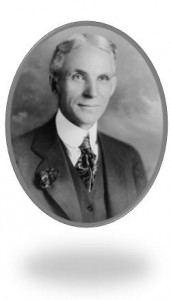by Jenny Kosek
I can’t stop thinking about Henry Ford. In 1913, the auto tycoon had a problem. Despite the tremendous boom of the newly hatched auto industry, Ford simply could not get people to work for him. Quickly exhausted and bored by the mind-numbing tedium of assembly line work, men quit as quickly as Ford could hire them. In fact, for every 100 men Ford needed on his lines, he had to hire 1000 to try to keep up with the astounding rate of turnover.
So, Ford figured out a way to make a lousy sell more attractive.
In  January 1914, Ford announced he was raising all of his line workers’ pay from $2.34 a day to $5, and shortening the workday from nine hours to eight. The next day, 10,000 men waited at Ford’s door, desperate for a chance to work for him.

The ramifications of Henry Ford’s revolutionary decision are still being debated by historians, economists, and business buffs, but what Ford simply did was create value. The work he was offering was just as grim and monotonous as it had always been; but by making it valuable, Ford sold thousands of men on the idea that his work was the best work to have.
Value isn’t about dollars (especially in Ford’s case, where the fine print did not actually pay those men that glorious $5 after all). It’s about offering something unique, something no one else is offering, something that other people want. How do you know if you need to adjust your brand value?
You’ve got to pull a Henry Ford:
- Review your problems. Ford couldn’t keep people on his payroll. Perhaps your pharmacy is losing customers, or your product isn’t getting picked up for distribution. Identify your challenges and be honest about them.
- Consider potential reasons for the problem. Ford’s work was grueling and tedious. Why might your pharmacy be losing customers? Why isn’t your product attracting distributers?
- Identify your strengths. Ford’s work was steady and fair, and less dangerous than many other occupations of the period. What are your brand’s assets? Is your staff exceptional? Is your product effective?
- Be better, and be successful. In Ford’s day, laborers had their pick of hard, dull jobs. By shortening hours but raising pay, Ford made his hard, dull jobs the most in-demand jobs in town. Where can you shorten hours and raise pay--that is, where can you differentiate your brand’s value to become an in-demand product?
Value is not inherent, but is created by strategically framing and effectively selling an idea, product, or service. Ford recognized that simply offering work wasn’t enough. He needed to make that work valuable in order to keep men on his lines. If your offering is struggling, it’s likely time to review its value. Are you offering $2.34 a day, just like everyone else? Bump that up to $5 and see how valuable you become.

